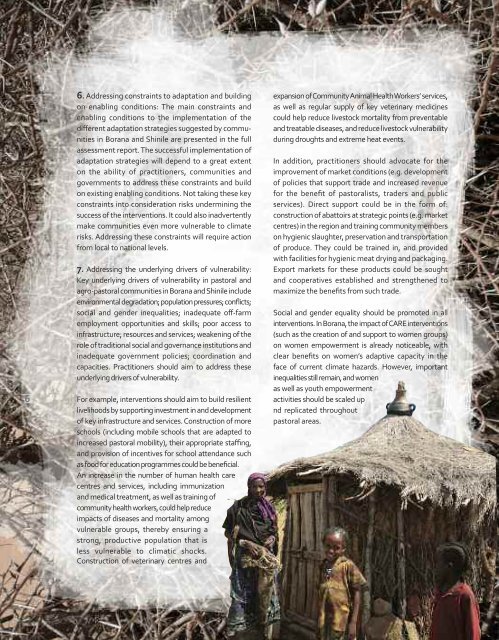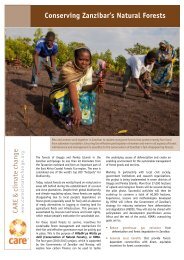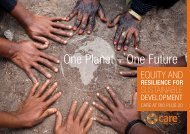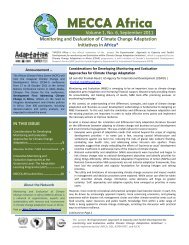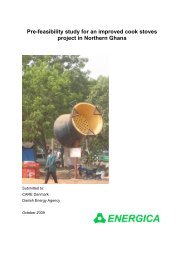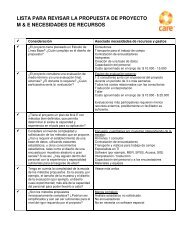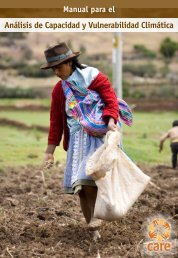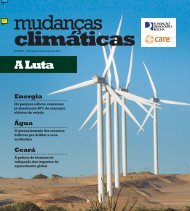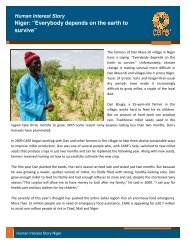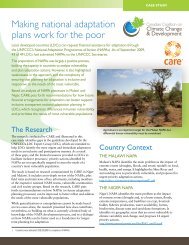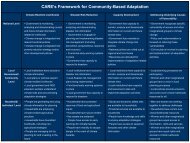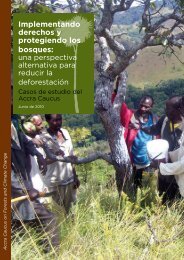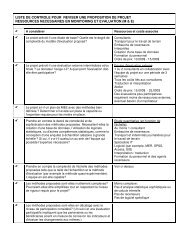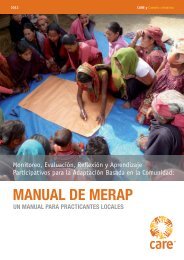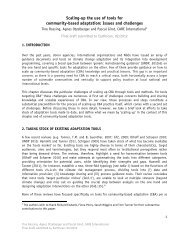Policy Brief - CARE Climate Change
Policy Brief - CARE Climate Change
Policy Brief - CARE Climate Change
You also want an ePaper? Increase the reach of your titles
YUMPU automatically turns print PDFs into web optimized ePapers that Google loves.
6<br />
6. Addressing constraints to adaptation and building<br />
on enabling conditions: The main constraints and<br />
enabling conditions to the implementation of the<br />
different adaptation strategies suggested by communities<br />
in Borana and Shinile are presented in the full<br />
assessment report. The successful implementation of<br />
adaptation strategies will depend to a great extent<br />
on the ability of practitioners, communities and<br />
governments to address these constraints and build<br />
on existing enabling conditions. Not taking these key<br />
constraints into consideration risks undermining the<br />
success of the interventions. It could also inadvertently<br />
make communities even more vulnerable to climate<br />
risks. Addressing these constraints will require action<br />
from local to national levels.<br />
7. Addressing the underlying drivers of vulnerability:<br />
Key underlying drivers of vulnerability in pastoral and<br />
agro-pastoral communities in Borana and Shinile include<br />
environmental degradation; population pressures; conflicts;<br />
social and gender inequalities; inadequate off-farm<br />
employment opportunities and skills; poor access to<br />
infrastructure; resources and services; weakening of the<br />
role of traditional social and governance institutions and<br />
inadequate government policies; coordination and<br />
capacities. Practitioners should aim to address these<br />
underlying drivers of vulnerability.<br />
For example, interventions should aim to build resilient<br />
livelihoods by supporting investment in and development<br />
of key infrastructure and services. Construction of more<br />
schools (including mobile schools that are adapted to<br />
increased pastoral mobility), their appropriate staffing,<br />
and provision of incentives for school attendance such<br />
as food for education programmes could be beneficial.<br />
An increase in the number of human health care<br />
centres and services, including immunization<br />
and medical treatment, as well as training of<br />
community health workers, could help reduce<br />
impacts of diseases and mortality among<br />
vulnerable groups, thereby ensuring a<br />
strong, productive population that is<br />
less vulnerable to climatic shocks.<br />
Construction of veterinary centres and<br />
expansion of Community Animal Health Workers’ services,<br />
as well as regular supply of key veterinary medicines<br />
could help reduce livestock mortality from preventable<br />
and treatable diseases, and reduce livestock vulnerability<br />
during droughts and extreme heat events.<br />
In addition, practitioners should advocate for the<br />
improvement of market conditions (e.g. development<br />
of policies that support trade and increased revenue<br />
for the benefit of pastoralists, traders and public<br />
services). Direct support could be in the form of:<br />
construction of abattoirs at strategic points (e.g. market<br />
centres) in the region and training community members<br />
on hygienic slaughter, preservation and transportation<br />
of produce. They could be trained in, and provided<br />
with facilities for hygienic meat drying and packaging.<br />
Export markets for these products could be sought<br />
and cooperatives established and strengthened to<br />
maximize the benefits from such trade.<br />
Social and gender equality should be promoted in all<br />
interventions. In Borana, the impact of <strong>CARE</strong> interventions<br />
(such as the creation of and support to women groups)<br />
on women empowerment is already noticeable, with<br />
clear benefits on women’s adaptive capacity in the<br />
face of current climate hazards. However, important<br />
inequalities still remain, and women<br />
as well as youth empowerment<br />
activities should be scaled up<br />
nd replicated throughout<br />
pastoral areas.


